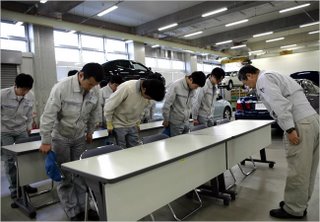Kaizen Mind: Essential to High Performance Scrum Teams
 Ko Sasaki for The New York Times. An instructor ends a class on auto maintenance. The program is part of Toyota's efforts to maintain quality in the face of rapid overseas expansion.
Ko Sasaki for The New York Times. An instructor ends a class on auto maintenance. The program is part of Toyota's efforts to maintain quality in the face of rapid overseas expansion.In the typical company where I do Scrum consulting there may be urgency around improving the software development process without any urgency about changing processes that are broken today. A company wide impediment list needs to be maintained and the top item on the list needs a remediation plan and action today, not tomorrow. Eliminating impediments is a primary role for the ScrumMaster who may need help from other parts of the company.
Avoiding complacency and acting aggressively requires "Kaizen mind." Toyota employees do not come to work today assuming nothing is broken. They feel that it is a crisis if they do not improve today by changing what they are doing so they do it better. There is no staying in the same place. Either you deteriorate or you move forward. Honesty, transparency, and trust are needed to surface and openly discuss impediments to progress. You cannot move forward without eliminating impediments.
A major focus of my ScrumMaster Certification courses is to instill "Kaizen mind" in participants. A CMMI Level 5 company did a retrospective on ScrumMaster's trained with this emphasis and found their results in terms of productivity, customer and developer satisfaction where better than those not receiving some "Kaizen mind" training. It's all about the mindset!
Tracking velocity of your Scrum teams is essential to successful planning and implementation. Improving your velocity requires acceleration! Toyota has discovered the secret sauce and will soon be number one in the world of auto manufacturing. They are still accelerating away from competitors. Scrum teams can help software companies do the same.
The ‘Toyota Way’ Is Translated for a New Generation of Foreign Managers
By Maring Fackler, New York Times, February 15, 2007
“There is a sense of danger,” said Koki Konishi, a Toyota general manager who heads the institute (the Toyota Technical Skills Academy in Toyota City). “We must prevent the Toyota Way from getting more and more diluted as Toyota grows overseas.”
It used to be enough for the culture to be transmitted by word of mouth among Toyota’s Japanese employees, on factory floors and around cafeteria tables. But Toyota outgrew these informal teaching methods and created the institute, which is so secretive the company would not allow a reporter to visit it, let alone sit in on any classes. Mr. Konishi said Toyota was building similar centers in the United States, in Kentucky, and in Thailand.
“Before, when everyone was Japanese, we didn’t have to make these things explicit,” Mr. Konishi said. “Now we have to set the Toyota Way down on paper and teach it.”
“Mutual ownership of problems,” is one slogan. Other tenets include “genchi genbutsu,” or solving problems at the source instead of behind desks, and the “kaizen mind,” an unending sense of crisis behind the company’s constant drive to improve.
Labels: toyota lean kaizen
 Scrum is an Agile development framework that Jeff Sutherland invented at Easel Corporation in 1993. Jeff worked with Ken Schwaber to formalize Scrum at
Scrum is an Agile development framework that Jeff Sutherland invented at Easel Corporation in 1993. Jeff worked with Ken Schwaber to formalize Scrum at 

1 Comments:
There are a number of globalization hurdles Toyota has to overcome. Obviously, it should make no different where Toyota vehicles are made from quality perspective, however the Japanese cooperation of manufacturers, suppliers, distributors and banks in closely-knit groups (keiretsu) and big firm shushin koyo makes Japan unique as a nation. Nevertheless, despite record sales, Toyota's quality reputation has been hit by a series of recalls that you could blame on its rush to cut costs. Here in the UK we are not bad at making cars: Toyota's plant in Derbyshire and the Nissan plant in Sunderland are among the most efficient in Europe - although Nissan did report a 23% slump in profits yesterday for the last quarter of 2006, blaming the poor results on rising commodity costs, fierce competition and stagnant sales. Part of the problem Toyota may face in the US could stem from strict house agreements with unions and employee costs, eg healthcare, has risen faster than inflation for many years.
Rob
www.rob-thompson.net
www.63buckets.co.uk (lean)
www.qualityhero.co.uk (six sigma)
Post a Comment
<< Home